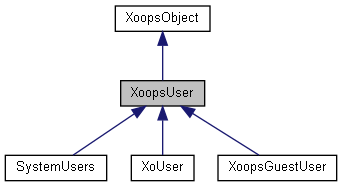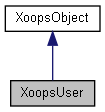|
| | __construct ($id=null) |
| |
| | isGuest () |
| |
| | incrementPost () |
| |
| | setGroups ($groupsArr) |
| |
| & | getGroups () |
| |
| & | groups () |
| |
| | isAdmin ($module_id=null) |
| |
| | rank () |
| |
| | isActive () |
| |
| | isOnline () |
| |
| | uid ($format='') |
| |
| | id ($format='N') |
| |
| | name ($format='S') |
| |
| | uname ($format='S') |
| |
| | email ($format='S') |
| |
| | url ($format='S') |
| |
| | user_avatar ($format='S') |
| |
| | user_regdate ($format='') |
| |
| | user_icq ($format='S') |
| |
| | user_from ($format='S') |
| |
| | user_sig ($format='S') |
| |
| | user_viewemail ($format='') |
| |
| | actkey ($format='') |
| |
| | user_aim ($format='S') |
| |
| | user_yim ($format='S') |
| |
| | user_msnm ($format='S') |
| |
| | pass ($format='') |
| |
| | posts ($format='') |
| |
| | attachsig ($format='') |
| |
| | level ($format='') |
| |
| | theme ($format='') |
| |
| | timezone ($format='') |
| |
| | umode ($format='') |
| |
| | uorder ($format='') |
| |
| | notify_method ($format='') |
| |
| | notify_mode ($format='') |
| |
| | user_occ ($format='S') |
| |
| | bio ($format='S') |
| |
| | user_intrest ($format='S') |
| |
| | getProfile () |
| |
| | __construct () |
| |
| | XoopsObject () |
| |
| | setNew () |
| |
| | unsetNew () |
| |
| | isNew () |
| |
| | setDirty () |
| |
| | unsetDirty () |
| |
| | isDirty () |
| |
| | initVar ($key, $data_type, $value=null, $required=false, $maxlength=null, $options='', $enumerations='') |
| |
| | assignVar ($key, $value) |
| |
| | assignVars ($var_arr) |
| |
| | setVar ($key, $value, $not_gpc=false) |
| |
| | setVars ($var_arr, $not_gpc=false) |
| |
| | destroyVars ($var) |
| |
| | destoryVars ($var) |
| |
| | setFormVars ($var_arr=null, $pref='xo_', $not_gpc=false) |
| |
| & | getVars () |
| |
| | getValues ($keys=null, $format='s', $maxDepth=1) |
| |
| | getVar ($key, $format=null) |
| |
| | cleanVars () |
| |
| | registerFilter ($filtername) |
| |
| | _loadFilters () |
| |
| | loadFilters ($method) |
| |
| | xoopsClone () |
| |
| | __clone () |
| |
| | setErrors ($err_str) |
| |
| | getErrors () |
| |
| | getHtmlErrors () |
| |
| | toArray () |
| |
◆ __construct()
| __construct |
( |
|
$id = null | ) |
|
constructor
- Parameters
-
| array | null | $id | ID of the user to be loaded from the database. |
◆ actkey()
◆ attachsig()
| attachsig |
( |
|
$format = '' | ) |
|
◆ bio()
◆ email()
get the user's email
- Parameters
-
- Returns
- string
◆ getGroups()
get the groups that the user belongs to
- Returns
- array array of groups
◆ getProfile()
◆ getUnameFromId()
| static getUnameFromId |
( |
|
$userid, |
|
|
|
$usereal = 0 |
|
) |
| |
|
static |
Updated by Catzwolf 11 Jan 2004 find the username for a given ID
- Parameters
-
| int | $userid | ID of the user to find |
| int | $usereal | switch for usename or realname |
- Returns
- string name of the user. name for 'anonymous' if not found.
◆ groups()
◆ id()
get the users UID
- Parameters
-
- Returns
- int
◆ incrementPost()
◆ isActive()
is the user activated?
- Returns
- bool
◆ isAdmin()
| isAdmin |
( |
|
$module_id = null | ) |
|
Is the user admin ?
This method will return true if this user has admin rights for the specified module.
- If you don't specify any module ID, the current module will be checked.
- If you set the module_id to -1, it will return true if the user has admin rights for at least one module
- Parameters
-
| int | $module_id | check if user is admin of this module |
- Returns
- bool is the user admin of that module?
◆ isGuest()
check if the user is a guest user
- Returns
- bool returns false
Reimplemented in XoopsGuestUser.
◆ isOnline()
is the user currently logged in?
- Returns
- bool
◆ level()
◆ name()
get the users name
- Parameters
-
- Returns
- string
◆ notify_method()
| notify_method |
( |
|
$format = '' | ) |
|
◆ notify_mode()
| notify_mode |
( |
|
$format = '' | ) |
|
◆ pass()
◆ posts()
◆ rank()
get the user's rank
- Returns
- array array of rank ID and title
@access private
◆ setGroups()
set the groups for the user
- Parameters
-
| array | $groupsArr | Array of groups that user belongs to |
◆ theme()
◆ timezone()
◆ uid()
get the users UID
- Parameters
-
- Returns
- int
◆ umode()
◆ uname()
get the user's uname
- Parameters
-
- Returns
- string
◆ uorder()
◆ url()
◆ user_aim()
| user_aim |
( |
|
$format = 'S' | ) |
|
◆ user_avatar()
| user_avatar |
( |
|
$format = 'S' | ) |
|
◆ user_from()
| user_from |
( |
|
$format = 'S' | ) |
|
◆ user_icq()
| user_icq |
( |
|
$format = 'S' | ) |
|
◆ user_intrest()
| user_intrest |
( |
|
$format = 'S' | ) |
|
◆ user_msnm()
| user_msnm |
( |
|
$format = 'S' | ) |
|
◆ user_occ()
| user_occ |
( |
|
$format = 'S' | ) |
|
◆ user_regdate()
| user_regdate |
( |
|
$format = '' | ) |
|
◆ user_sig()
| user_sig |
( |
|
$format = 'S' | ) |
|
◆ user_viewemail()
| user_viewemail |
( |
|
$format = '' | ) |
|
◆ user_yim()
| user_yim |
( |
|
$format = 'S' | ) |
|
◆ $_groups
◆ $_isAdmin
◆ $_isOnline
◆ $_rank
The documentation for this class was generated from the following file:




 Public Member Functions inherited from XoopsObject
Public Member Functions inherited from XoopsObject Data Fields inherited from XoopsObject
Data Fields inherited from XoopsObject





































